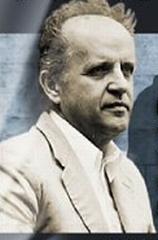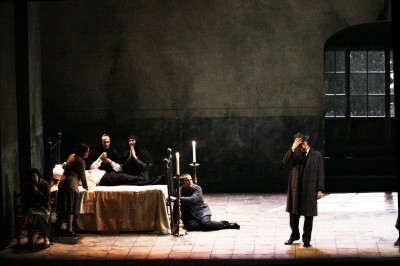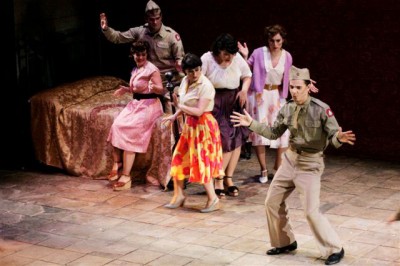NAPOLI MILIONARIA by Rota in Pisa.
By Fabio Bardelli on 3/26/13 • Categorized as Opera
Review by Fabio Bardelli
PISA: The opera Napoli Milionaria was composed by Italian composer Nino Rota on the libretto written by Neapolitan dramaturgist Eduardo de Filippo, taken from his homonymous drama play written just after the 2nd World War. Première of the opera found place in 1977 at Festival dei Due Mondi in Spoleto, with De Filippo as stage director and Bruno Bartoletti as conductor.
The work had a good success from the audience, but not from Italian musical critics, and it was very seldom staged in the following years. In fact actually Nino Rota was considered a not too much committed composer, far from modernity and from cultural avant-garde prevailing at that time. He followed more a certain 1900s Italian musical style, a musical trend in line with Menotti, Giordano or partially Puccini, with multistylistyc influences, as it’s easy to see in Rota‘s interest for American music and jazz.
Many years after that première in Spoleto ((that was followed with interest by information means at that time, I remember very well the live broadcasting made by Italian television) we can probably begin thinking different and consider Nino Rota in a more historical perspective.
He was born in Milan in 1911, and died in Rome in 1979, and was even a pupil of Pizzetti and Casella. Probably at that time his being a multiform musician was considered a limit more than a resource: he composed also many soundtracks for cinema, specially for Federico Fellini’s films, and also for theatre and television. All his musical production was probably understimated because Rota was considered a rather superficial and too “easy” musician
.
Certainly if we listen today to Napoli Milionaria, we can’t define it “a wonder”: Rota’s more celebrated opera (Il cappello di paglia di Firenze, Florence’s straw hat) is certainly better for inventiveness, verve and theatrical language. But the general musical pleasantness of Napoli Milionaria, its eclectic combinations, its “athmospheres” quite described by the author, its musical language even for a not crafty audience, all this make this opera rather easy to enjoy. The comparison with the famous de Filippo’s homonymous play surely damages Rota’s work, expecially for Italian audience. In fact in Italy Napoli Milionaria is not only very famous, but it’s almost the archetype of de Filippo’s theatre, and many people know it well, having seen it even on tv, on stage or cinema.
The plot takes place in a Naples’ alley, where people live on their wits, during 2nd World War, and it’s about the family of Gennaro Iovine, a man coming back home from the war finding his family destroyed by the war: his wife has a lover (and hard-hearted living on black market), his daughter is pregnant from an american soldier, his son involved in criminality and so on.
Eduardo de Filippo himself adapted his comedy writing the libretto, that follows more or less the play’s plot
. I think that Rota’s music can be considered less inspired with the secondary characters that distract from the real plot, but it’s very effective in the tipically italian melodic lines, for exemple in tenor’s writing and specially in Amalia’s vocality, in fact the soprano has to delineate both vocally both scenically a very interesting character. Rota writes very carefully for the orchestra, while the singing is too often only a declamato-line, rather anonimous even if theatrically efficient. There are also inevitable quotations of Neapolitan songs and the mandoline in orchestra. De Filippo himself changed partially the final of the plot, giving the possibility to Amalia to sing a very beautiful and heart-rending threnody on her son’s body, who was killed by the Police in an exchange of shots.
First of all I want to emphasize the great work made by the director Fabio Sparvoli with the young singers of Laboratorio L.T.L. Opera Studio 2012
. The essential scenes and costumes were by Alessandro Torella. There is a great attention to the acting, even if with little excesses in a stereotyped Neapolitan style, as for example in the scene of the “fake dead” in 1st Act, and beautiful ensembles.
Then i must extol young conductor Matteo Beltrami, who goes in deep into the score, careful to what happens on stage, wih a great attention to the melodies, the rhythms and the colours, very well followed by Orchestra della Toscana, really in a very good shape,
Main character was bariton Giuseppe Pellingra, vocally rather disappointing, then Marina Schevchenko depicting her beautiful character (Amalia) with full voice and expressivity
.
Gennaro’s daughter, Maria Rosaria, was a pleasant Manuela Ranno, and the tenor “Settebellizze” was a promising Dario Di Vietri, even if seemed sometimes not perfectly in tune. The other singers were on a rather good level, and were warmy commended by the rather scarce public. A performance like this could find certainly a larger audience, and this was the only really negative side of the whole evening.
Review by Fabio Bardelli
translation from italian Bruno Tredicine
Cast:
Gennaro Iovine, Giuseppe Pellingra
Amalia, sua moglie, Marina Shevchenco
Maria Rosaria, figlia, Manuela Ranno
Amedeo, figlio, Fabio Valenti
Errico Settebellizze, Dario Di Vietri
Peppe ‘o Cricco, Veio Torcigliani
Riccardo Spasiano, ragioniere, Juan José Navarro
Federico, Antonio Sapio
‘O Miezo Prevete, Gianluca Tumino
Pascalino ‘o pittore, Andrea Antonino Schifaudo
Il Brigadiere Ciappa, Giampiero Cicino
Johnny, sergente americano, Stefano Trizzino
Adelaide Schiano, Sofio Janelidze
Assunta, sua nipote, Emanuela Grassi
Donna Peppenella, Raluca Pescaru
Donna Vincenza, Teresa Gargano
Rituccia, l’ultima figlia di Gennaro, Eleonora Mascia
direttore, Matteo Beltrami
regia, Fabio Sparvoli
scene e costumi, Alessandra Torella
luci, Marco Minghetti
Orchestra della Toscana. Ensemble vocale del Progetto L.T.L. Opera Studio 2012, diretto da Mauro Fabbri
La scelta degli interpreti è il risultato del Laboratorio L.T.L. Opera Studio 2012



